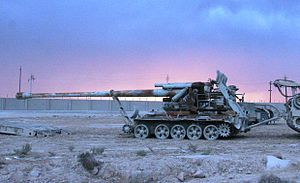Koksan (artillery)
| M-1978 Koksan | |
|---|---|

Koksan M-1978 170 mm artillery piece. Iraq, 2008
|
|
| Type | Self-propelled artillery |
| Place of origin | North Korea |
| Service history | |
| In service | 1978 - present |
| Used by | North Korea, Iran |
| Wars | Iran–Iraq War |
| Production history | |
| Manufacturer | Second Machine Industry Bureau, North Korea |
| Variants |
|
| Specifications | |
| Crew | 8 |
|
|
|
| Caliber | 170 mm |
| Rate of fire | ~1-2 rounds per 5 minutes |
| Effective firing range | ~40-60 km |
| Maximum firing range | 60 km (with RAP round) |
|
|
|
|
Main
armament |
170 mm (~6.69") gun |
| Engine | Diesel |
| Suspension | Torsion bar |
|
Operational
range |
~300 km |
| Speed | ~40 km/h |
The M-1978 (Koksan) is a 170 mm self-propelled (SP) gun of North Korean design and manufacture. Very little information is available due to the secretive nature of the North Korean government. The designations M-1978 and Koksan were given to the type by American military analysts, as they first became aware of it in that year in Koksan, North Korea.
What is known is that it is a 170 mm (~6.69") self-propelled gun of the open turret type. It was first seen publicly during a military parade in 1985. At least one example has been acquired by the United States.
According to Jane's, the Koksan is based on a Chinese Type 59 tank chassis. The 170 mm gun is in an open mount with no superstructure, and is stabilized when firing by two large retractable spades at the rear. The gun has a range that would allow it to strike Seoul from the Korean Demilitarized Zone.
The 170 mm gun itself is a previously unknown type, possibly Russian coastal-defence or ex-naval weapon, though the Soviet/Russian navies are not known to have used this caliber intermediate between their usual 152mm and 230mm calibers. Pre-1945 German armed forces did, however, so perhaps this weapon was designed to use Soviet-supplied stocks of captured German wartime ammunition. The M-1978 version carried no on-board ammunition supply.
In 1989, a new version of the Koksan appeared, that was designated the M-1989. The main difference was a lengthened chassis that allows 12 rounds of ammunition to be carried. It carries a crew of four; the remaining four personnel needed to man the gun ride in an accompanying ammunition and support vehicle.
Unlike its predecessor, the M-1989 has occasionally been put on public display by the North Koreans during parades and news broadcasts.
Little is publicly known about how North Korea organizes and deploys its artillery. It has been suggested that M-1978's and M-1989's equipped battalions consist of 12 guns, 20-30 trucks and 150-190 personnel, organized into three, four-gun batteries and a battalion headquarters. Battalions are organized into a brigade of 3-6 battalions. The brigade also includes a brigade headquarters as well as engineering, air-defense and target acquisition units.
In 1987, several M-1978s were supplied to Iran, and used during the Iran–Iraq War. When using rocket-assisted projectiles, a range of almost 60 kilometres (37 mi) could be achieved, making the weapon the world's longest-ranged field artillery piece at the time. Iranian forces used them to carry out long-range harassment fire against Kuwaiti oil fields.
...
Wikipedia
